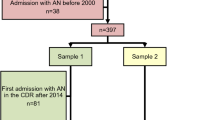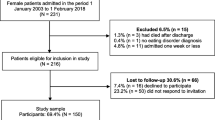Abstract
Objective: To evaluate the incidence and effects of factors potentially influencing eating disordered patients’ dropping out of outpatient cognitive-behavioural therapy (CBT). Method: Sixty-seven (64 female, 3 male) patients with eating disorders participated in the study. All patients followed a multidisciplinary team approach for a median period of 9 months. Several factors potentially affecting dropout were retrospectively assessed prior to treatment. Results: The dropout rate was significantly higher in patients with purging anorexia nervosa (AN) compared to those with restrictive AN, bulimia nervosa and eating disorder not otherwise specified (33% vs. 27%, 25% or 21%, respectively, p<0.05). Among several factors influencing dropout, there was a significant association of patient low cooperativeness, purging episodes, restrictive eating, use of several weight control practices and psychiatric co-morbidity in patients who dropped out compared to completers (all p<0.05). Conclusions: In outpatient eating disorder treatment, non-compliance and premature interruption of therapy are affected primarily by factors which are related to patients’ attitude and behaviour. These factors should be carefully addressed in patients with eating disorders to improve outcome.
Similar content being viewed by others
References
Becker A.E., Grinspoon S.K., Klibanski A., Herzog D.: Eating disorders. N. Engl. J. Med., 340, 1092–1098, 1999.
Clinton D.N.: Why do eating disorder patients drop out? Psychother. Psychosom., 65, 29–35, 1996.
Fassino S., Daga G.A., Piero A., Rovera G.G.: Dropout from brief psychotherapy in anorexia nervosa. Psychother. Psychosom., 71, 200–206, 2002.
Halmi K.A., Agras W.S., Crow S., Mitchell J., Wilson G.T, Bryson S.W., Kraemer H.C.: Predictors of treatment acceptance and completion in anorexia nervosa: implications for future study designs. Arch. Gen. Psychiatry, 62, 776–781, 2005.
Zeeck A., Hartmann A., Buchholz C., Herzog T.: Drop outs from in-patient treatment of anorexia nervosa. Acta Psychiatr. Scand., 111, 29–37, 2005.
Woodside D.B., Carter J.C., Blackmore E.: Predictors of premature termination of inpatient treatment for anorexia nervosa. Am. J Psychiatry., 161, 2277–2281, 2004.
Pike K.M., Walsh B.T., Vitousek K., Wilson G.T., Bauer J.: Cognitive behavior therapy in the posthospitalization treatment of anorexia nervosa. Am. J. Psychiatry, 160, 2046–2049, 2003.
Kahn C., Pike K.: In search of predictors of dropout from in patient treatment for anorexia nervosa. Int. J. Eat. Disord., 30, 237–244, 2001.
Vandereycken W., Pierloot R.: Drop-out during inpatient treatment of anorexia nervosa: a clinical study 133 patients. Br. J. Med. Psychol., 56, 145–156, 1983.
McKisack C., Waller G.: Why is attendance variable at groups for women with bulimia nervosa? The role of eating psychopathology and other characteristics. Int. J. Eat. Disord. 20, 205–209, 1996.
Steel Z., Jones J., Adcock S., Clancy R., Bridgford-West L., Austin J.: Why the high rate of dropout from individualized cognitive-behaviour therapy for bulimia nervosa? Int. J. Eat. Disord., 28, 209–214, 2000.
Coker S., Vize C., Wade T., Cooper P.J.: Patients with bulimia nervosa who fail to engage in cognitive-behaviour therapy. Int. J. Eat. Disord., 13, 35–40, 1993.
Blouin J., Schnarre K., Carter J., Blouin A., Tener L., Zuro C., Barlow J.: Factors affecting dropout rate from cognitive-behavioural group treatment for bulimia nervosa. Int. J. Eat. Disord., 17, 323–329, 1995.
Waller G.: Drop-out and failure to engage in individual outpatient cognitive behaviour therapy for bulimic disorders. Int. J. Eat. Disord., 22, 35–41, 1997.
Fassino S., Abbate-Daga G., Piero A., Leombruni P., Rovera G.G.: Drop-out from brief psichotherapy within a combination treatment in bulimia nervosa: role of personality and anger. Psychother. Psychosom., 72, 203–210, 2003.
Carter J.C., Olmsted M.P., Kaplan A.S., McCabe R.E., Mills J.S., Aime A.: Self-help for bulimia nervosa: a randomized controlled trial. Am. J. Psychiatry, 160, 973–978, 2003.
Swan-Kremeier L.A., Mitchell J.E., Twardowski T., Lancaster K., Crosby R.D.: Travel distance and attrition in outpatient eating disorders treatment. Int. J. Eat. Disord., 38, 367–370, 2005.
American Psychiatric Association. Diagnostic and Statistical Manual of Mental Disorders, 4th Ed. Washington, DC, American Psychiatric Association, 1994.
World Health Organization (WHO). ICD-10 Classificazione statistica internazionale delle malattie e dei problemi sanitari correlati, Decima revisione, 3 vol. Roma, Istituto Poligrafico dello Stato, 2000.
Guaraldi G.P., De Girolamo G., Mazzi F., Morosini P., Lussetti M.: Structured Clinical Interview for DSM-IV: versione italiana. Firenze, Organizzazioni Speciali, 2000.
Pfohl B., Blum N., Zimmerman M.: Structured Interview for DSM-IV Personality (SIDP-IV). Arlington, American Psychiatric Publishing, Inc., 1997.
Derogatis L.R.: SCL-90-R, administration, scoring and procedures manual-I for the revised version. Baltimore, MD, Johns Hopkins University School of Medicine, 1977.
Garner D.M.: Eating disorder inventory-2. Professional manual. Odessa, FL, Psychological Assessment Resources, 1991.
Garner D.M., Olmsted M.P., Bohr Y., Garfinkel P.E.: The eating attitudes test: psychometric features and clinical correlates. Psychol. Med., 12, 871–878, 1982.
Horowitz L.M., Rosenberg S.E., Baer B.A., Ureno G., Villasenor V.: Inventory of interpersonal problems: psychometric properties and clinical applications. J. Consult. Clin. Psychol., 56, 885–892, 1988.
Fassino S., Amianto F., Gramaglia C., Facchini F., Abbate Daga G.: Temperament and character in eating disorders: ten years of studies. Eat. Weight Disord., 9, 81–90, 2004.
Fairburn C.G., Jones R., Peveler R., Hope R.A., O’Connor M.: Psychotherapy and bulimia nervosa. Arch. Gen. Psychiatry, 50, 419–428, 1993.
Safer D.L., Telch C.F., Agras W.S.: Dialectical behaviour therapy for bulimia nervosa. Am. J. Psychiatry, 158, 632–634, 2001.
Prochaska J.O., DiClemente C.C.: Transtheoretical therapy: Toward a more integrative model of change. Psychotherapy, theory, research and practice, 19, 276–288, 1982.
Mahon J.: Dropping out from psychological treatment for eating disorders: what are the issues? Eur. Eat. Dis. Rev., 8, 198–216, 2000.
Di Pietro G., Valoroso L., Fichele M., Bruno C., Sorge F.: What happens to eating disorder outpatients who withdrew from therapy? Eat. Weight Disord., 7, 298–303, 2002.
Van Furth E.F., Van Strien D.C., Martina L.M., Van Son M.J., Hendrickx J.J., Van Engeland H.: Expressed emotion and the prediction of outcome in adolescent eating disorders. Int. J. Eat. Disord., 20, 19–31, 1996.
Surgenor L., Maguire S., Beumont P.: Drop-out from inpatient treatment for anorexia nervosa: can risk factors be identified at point of admission? Eur. Eat. Dis. Rev., 12, 94–100, 2004.
Probst M., Vandereycken W., Van Coppenolle H., Pieters G.: Body experience in eating disorders before and after treatment: a follow-up study. Eur. Psychiatry, 14, 333–340, 1999.
Rubel J.A.: The function of self-help groups in recovery from anorexia nervosa and bulimia. Psychiatr. Clin. North Am., 7, 381–394, 1984.
Mahon J., Bradley S.N., Harvey P.K., Winston A.P., Palmer R.L.: Childhood trauma has dose-effect relationship with dropping out from psychotherapeutic treatment for bulimia nervosa: a replication. Int. J. Eat. Disord., 30, 138–148, 2001.
Griffiths R.A., Beumont P.J., Giannakopoulos E., Russell J., Schotte D., Thornton C., Touyz S.W., Varano P.: Measuring self-esteem in dieting disordered patients: the validity of the Rosenberg and Coopersmith contrasted. Int. J. Eat. Disord., 25, 227–231, 1999.
Author information
Authors and Affiliations
Corresponding author
Rights and permissions
About this article
Cite this article
Bandini, S., Antonelli, G., Moretti, P. et al. Factors affecting dropout in outpatient eating disorder treatment. Eat Weight Disord 11, 179–184 (2006). https://doi.org/10.1007/BF03327569
Received:
Accepted:
Published:
Issue Date:
DOI: https://doi.org/10.1007/BF03327569




